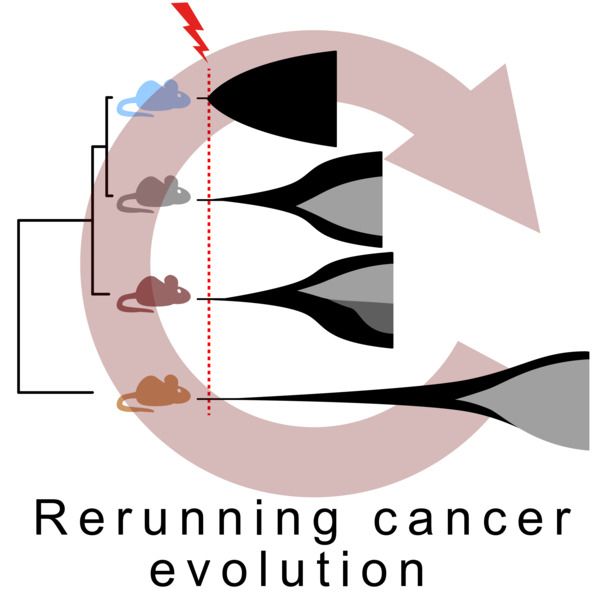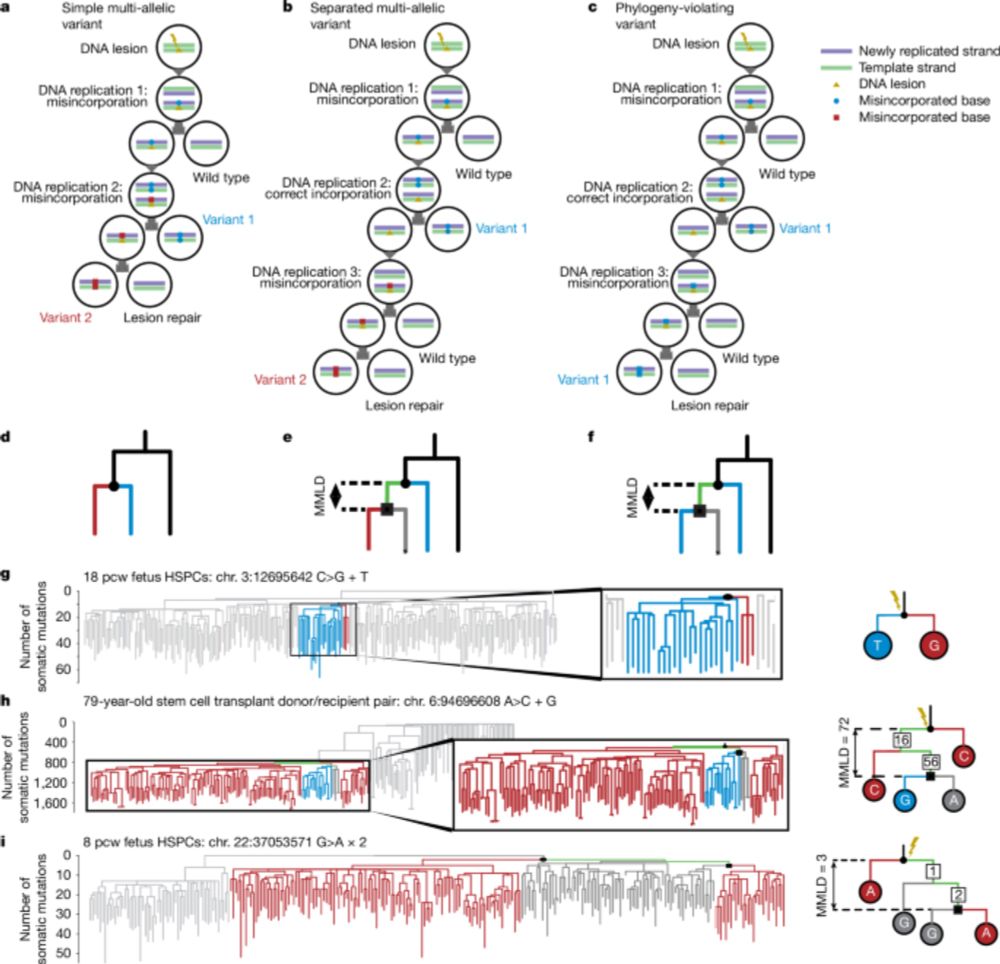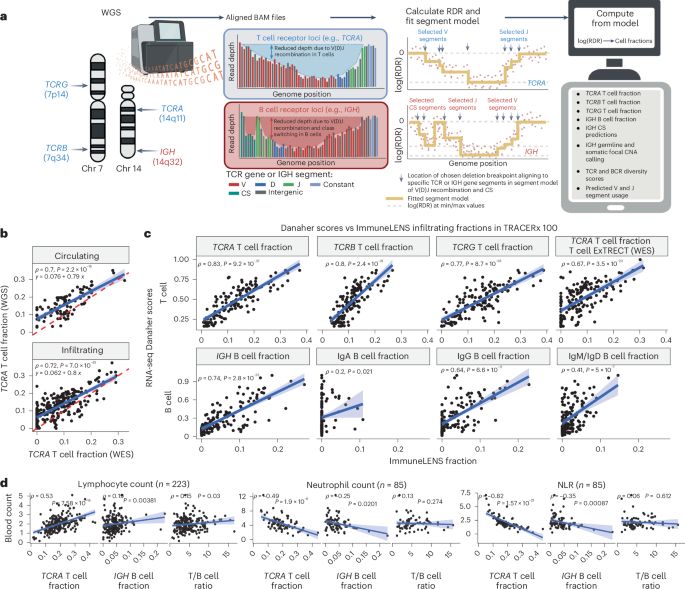The exciting next instalment of Mutations in Time and Space... Open for registration now
04.11.2025 10:28 — 👍 8 🔁 7 💬 0 📌 0
A really interesting and insightful paper Vova.
05.10.2025 13:59 — 👍 0 🔁 0 💬 1 📌 0

IGC is looking for a Core Facility Bioinformatician to provide bioinformatics expertise and support to researchers across the Institute, working at the intersection of computational and experimental science. Find out more and apply by 13 October: edin.ac/3R5dEBU
@cmvm-edinburghuni.bsky.social
03.09.2025 13:15 — 👍 3 🔁 4 💬 0 📌 0

PhD Student in Mutational Processes Driving Somatic Evolution
Would you like to do some unique experiments in cancer genomics and mutagenesis, in beautiful Munich? Well then apply for this PhD position: jobs.dkfz.de/en/jobs/1679...
You'll learn a lot and it'll be fun and interesting!
#DKTK @dkfz.bsky.social @lmumuenchen.bsky.social
19.08.2025 14:54 — 👍 10 🔁 7 💬 0 📌 1
My lab at hiring! - we have TWO postdoc positions (one computational, one wet lab focussed) at Yale @yaleschoolofmed.bsky.social, working closely with our group members at University of Cambridge, UK @cambridgeuni.bsky.social
Please help to spread the word!
Adverts with full details below ⬇️
26.03.2025 15:31 — 👍 25 🔁 31 💬 2 📌 1
[2/2] Within a strain, that's divergence from a common starting point. The more heterogeneity (divergence) amongst tumours generated, the less the path of tumour development has been fully determined by the controlled variables.
16.01.2025 18:05 — 👍 1 🔁 0 💬 1 📌 0
[1/2] Throughout the paper we do talk about convergence of phenotypes between strains. For each strain the we took the same starting point (genetics, environment, sex, exposure) and asked how consistent were the tumours produced (same drivers, mutations, expression, selection)?
16.01.2025 18:04 — 👍 0 🔁 0 💬 1 📌 0

In science, we often see weird blips in the data. The question: is it artefact (usually!), or something new & exciting? We don’t always have time to dig deep.
Our paper in @nature.com today came from just such a blip. So don’t ignore the weird stuff. Pull on that thread...
15.01.2025 21:44 — 👍 49 🔁 17 💬 7 📌 1

Manuscript logo, phylogenetic tree of mouse strains with different but highly reproducible patterns of cancer evolution. Demonstrated by rerunning cancer evolution in a controlled system.
To what extent is cancer development deterministic and predictable..?
Does the germline genome affect that predictability...?
Preprint: www.biorxiv.org/content/10.1...
15.01.2025 19:31 — 👍 17 🔁 8 💬 2 📌 0

Prolonged persistence of mutagenic DNA lesions in somatic cells - Nature
Persistent DNA lesions can occur throughout the human lifespan and can remain in the genome of affected cells for several years and generate a substantial proportion of the mutational burden.
Building on our discovery of #LesionSegregation, @mikespencerchapman.bsky.social and colleagues from @sangerinstitute.bsky.social find that some DNA lesions can persist in humans for months or years!
"Prolonged persistence of mutagenic DNA lesions in somatic cells"
www.nature.com/articles/s41...
15.01.2025 17:21 — 👍 23 🔁 11 💬 1 📌 1
Labour Member of Parliament for Newcastle upon Tyne Central and West. Chair of the House of Commons Science, Innovation and Technology Committee.
Chancellor's Fellow (~Asst. Prof.) University of Edinburgh
| Math modelling for somatic genomics | https://michaeldnicholson.github.io
Scientist interested in genome integrity maintenance mechanisms and cancer
whole genome molecular oncology, genome graphs and graph genomes, cancer karyotype assembly, cancer chromosome folding, breakage fusion bridge cycles, tyfonas, and other HSRs
Group Leader, MRC Laboratory of Molecular Biology & Joint Head of the Division of Protein & Nucleic Acid Chemistry. Senior Executive Editor, Nucleic Acids Research.
Our mission is to improve the lives of people living with genetic disease and cancer through research.
Sudmantlab.org - Assistant professor Berkeley
Professor of Cancer Evolution. UCL Cancer Institute. Interested in cancer genomics, bioinformatics, and somatic evolution.
https://www.ucl.ac.uk/medical-sciences/divisions/cancer/our-research/cancer-genome-evolution
Postdoc at UPenn thinking about mutations, cells, and evolution.
Study genetic conflicts professionally. Try to avoid conflicts in personal life (with mixed results).
Fred Hutch Basic Sciences,
UW Genome Sciences,
HHMI.
Posting in a personal capacity. My posts don’t reflect my employers’ opinions.
Interested in DNA damage, mutations, adaptation and evolution.
DKTK, DKFZ, LMU https://dktk.dkfz.de/en/research/dktk-researchers/anderson-group
Munich, Germany
Molecular Biologist | Epigenetics and Adaptation | Postdoctoral Research Fellow at the University of Cambridge | Branco Weiss Fellow | sitotg.com
Myeloma (epi)genome, structural variants & multiomics. Mum of two boys. Based in the UK.
Senior Editor @Nature for cancer and cell cycle. Views my own
Group leader at the Danish Cancer Institute and Professor at University of Copenhagen #NNFCPR. Interested in epigenetics, genome maintenance, aging & cancer, creativity & innovation, society in general. Opinions are my own.
Group of Adrien Hallou @kiroxford.bsky.social @ox.ac.uk
Biophysics & spatial biology of cell fate decisions & tissue dynamics
Alumnus @cam.ac.uk & @normalesup.bsky.social
Franco-British Young Leader 2024 🇨🇵🇬🇧
Oncologist. Chief Scientist at AstraZeneca. Trained at @MGHCancerCenter. Interested in the evolution of drug resistance. Views are my own.
Academic pathologist (MD PhD) based in the UK.
Paediatric Pathology resident (Specialty Registrar), Great Ormond Street Hospital, London, UK.
Clinical Training Fellow / JSPS Clinical Lecturer, UCL Cancer Institute, London, UK.








